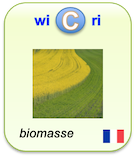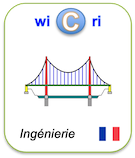Theoretical study of the thermal decomposition of the 5-methyl-2-furanylmethyl radical.
Identifieur interne : 000069 ( PubMed/Curation ); précédent : 000068; suivant : 000070Theoretical study of the thermal decomposition of the 5-methyl-2-furanylmethyl radical.
Auteurs : Baptiste Sirjean [France] ; René FournetSource :
- The journal of physical chemistry. A [ 1520-5215 ] ; 2012.
Descripteurs français
- KwdFr :
- MESH :
English descriptors
- KwdEn :
- MESH :
- chemical , chemistry : Free Radicals, Furans.
- Molecular Structure, Quantum Theory, Thermodynamics.
Abstract
The thermal decomposition of the 5-methyl-2-furanylmethyl radical (R(1)), the most important primary radical formed during the combustion and thermal decomposition of 2,5-dimethylfuran (a promising next-generation biofuel), was studied using CBS-QB3 calculations and master equation (ME)/RRKM modeling. Because very little information is available in the literature, the detailed potential energy surface (PES) was investigated thoroughly. Only the main pathways, having a kinetic influence on the decomposition of R(1), were retained in the final ME/RRKM model. Among all the channels studied, the ring-opening of the 5-methyl-2-furanylmethyl radical, followed by ring enlargement to form cyclohexadienone molecules is predicted to be the easiest decomposition channel of R(1). The C(6) cyclic species formed can undergo unimolecular reactions to yield phenol and to a lesser extent cyclopentadiene and CO. Our calculations predict that these species are important products formed during the pyrolysis of 2,5-dimethylfuran (DMF). Other channels involved in the decomposition of R(1) lead directly to the formation of linear and cyclic unsaturated C(5) species and constitute an additional source of cyclopentadiene and CO. High-pressure limit rate constants were computed as well as thermochemical properties for important species. ME/RRKM analysis was performed to probe the influence of pressure on the rate coefficients and pressure dependent rate coefficients were proposed for pressures and temperatures ranging, respectively, from 10(-2) bar to 10 bar and 1000 to 2000 K.
DOI: 10.1021/jp303680h
PubMed: 22650318
Links toward previous steps (curation, corpus...)
- to stream PubMed, to step Corpus: Pour aller vers cette notice dans l'étape Curation :000069
Links to Exploration step
pubmed:22650318Le document en format XML
<record><TEI><teiHeader><fileDesc><titleStmt><title xml:lang="en">Theoretical study of the thermal decomposition of the 5-methyl-2-furanylmethyl radical.</title><author><name sortKey="Sirjean, Baptiste" sort="Sirjean, Baptiste" uniqKey="Sirjean B" first="Baptiste" last="Sirjean">Baptiste Sirjean</name><affiliation wicri:level="1"><nlm:affiliation>Laboratoire Réactions et Génie des Procédés, CNRS, Université de Lorraine, ENSIC, 1 rue Grandville BP 20451, 54001 Nancy Cedex, France.</nlm:affiliation><country xml:lang="fr">France</country><wicri:regionArea>Laboratoire Réactions et Génie des Procédés, CNRS, Université de Lorraine, ENSIC, 1 rue Grandville BP 20451, 54001 Nancy Cedex</wicri:regionArea></affiliation></author><author><name sortKey="Fournet, Rene" sort="Fournet, Rene" uniqKey="Fournet R" first="René" last="Fournet">René Fournet</name></author></titleStmt><publicationStmt><idno type="wicri:source">PubMed</idno><date when="2012">2012</date><idno type="doi">10.1021/jp303680h</idno><idno type="RBID">pubmed:22650318</idno><idno type="pmid">22650318</idno><idno type="wicri:Area/PubMed/Corpus">000069</idno><idno type="wicri:explorRef" wicri:stream="PubMed" wicri:step="Corpus" wicri:corpus="PubMed">000069</idno><idno type="wicri:Area/PubMed/Curation">000069</idno><idno type="wicri:explorRef" wicri:stream="PubMed" wicri:step="Curation">000069</idno></publicationStmt><sourceDesc><biblStruct><analytic><title xml:lang="en">Theoretical study of the thermal decomposition of the 5-methyl-2-furanylmethyl radical.</title><author><name sortKey="Sirjean, Baptiste" sort="Sirjean, Baptiste" uniqKey="Sirjean B" first="Baptiste" last="Sirjean">Baptiste Sirjean</name><affiliation wicri:level="1"><nlm:affiliation>Laboratoire Réactions et Génie des Procédés, CNRS, Université de Lorraine, ENSIC, 1 rue Grandville BP 20451, 54001 Nancy Cedex, France.</nlm:affiliation><country xml:lang="fr">France</country><wicri:regionArea>Laboratoire Réactions et Génie des Procédés, CNRS, Université de Lorraine, ENSIC, 1 rue Grandville BP 20451, 54001 Nancy Cedex</wicri:regionArea></affiliation></author><author><name sortKey="Fournet, Rene" sort="Fournet, Rene" uniqKey="Fournet R" first="René" last="Fournet">René Fournet</name></author></analytic><series><title level="j">The journal of physical chemistry. A</title><idno type="eISSN">1520-5215</idno><imprint><date when="2012" type="published">2012</date></imprint></series></biblStruct></sourceDesc></fileDesc><profileDesc><textClass><keywords scheme="KwdEn" xml:lang="en"><term>Free Radicals (chemistry)</term><term>Furans (chemistry)</term><term>Molecular Structure</term><term>Quantum Theory</term><term>Thermodynamics</term></keywords><keywords scheme="KwdFr" xml:lang="fr"><term>Furanes ()</term><term>Radicaux libres ()</term><term>Structure moléculaire</term><term>Thermodynamique</term><term>Théorie quantique</term></keywords><keywords scheme="MESH" type="chemical" qualifier="chemistry" xml:lang="en"><term>Free Radicals</term><term>Furans</term></keywords><keywords scheme="MESH" xml:lang="en"><term>Molecular Structure</term><term>Quantum Theory</term><term>Thermodynamics</term></keywords><keywords scheme="MESH" xml:lang="fr"><term>Furanes</term><term>Radicaux libres</term><term>Structure moléculaire</term><term>Thermodynamique</term><term>Théorie quantique</term></keywords></textClass></profileDesc></teiHeader><front><div type="abstract" xml:lang="en">The thermal decomposition of the 5-methyl-2-furanylmethyl radical (R(1)), the most important primary radical formed during the combustion and thermal decomposition of 2,5-dimethylfuran (a promising next-generation biofuel), was studied using CBS-QB3 calculations and master equation (ME)/RRKM modeling. Because very little information is available in the literature, the detailed potential energy surface (PES) was investigated thoroughly. Only the main pathways, having a kinetic influence on the decomposition of R(1), were retained in the final ME/RRKM model. Among all the channels studied, the ring-opening of the 5-methyl-2-furanylmethyl radical, followed by ring enlargement to form cyclohexadienone molecules is predicted to be the easiest decomposition channel of R(1). The C(6) cyclic species formed can undergo unimolecular reactions to yield phenol and to a lesser extent cyclopentadiene and CO. Our calculations predict that these species are important products formed during the pyrolysis of 2,5-dimethylfuran (DMF). Other channels involved in the decomposition of R(1) lead directly to the formation of linear and cyclic unsaturated C(5) species and constitute an additional source of cyclopentadiene and CO. High-pressure limit rate constants were computed as well as thermochemical properties for important species. ME/RRKM analysis was performed to probe the influence of pressure on the rate coefficients and pressure dependent rate coefficients were proposed for pressures and temperatures ranging, respectively, from 10(-2) bar to 10 bar and 1000 to 2000 K.</div></front></TEI><pubmed><MedlineCitation Owner="NLM" Status="MEDLINE"><PMID Version="1">22650318</PMID><DateCreated><Year>2012</Year><Month>06</Month><Day>28</Day></DateCreated><DateCompleted><Year>2012</Year><Month>10</Month><Day>31</Day></DateCompleted><Article PubModel="Print-Electronic"><Journal><ISSN IssnType="Electronic">1520-5215</ISSN><JournalIssue CitedMedium="Internet"><Volume>116</Volume><Issue>25</Issue><PubDate><Year>2012</Year><Month>Jun</Month><Day>28</Day></PubDate></JournalIssue><Title>The journal of physical chemistry. A</Title><ISOAbbreviation>J Phys Chem A</ISOAbbreviation></Journal><ArticleTitle>Theoretical study of the thermal decomposition of the 5-methyl-2-furanylmethyl radical.</ArticleTitle><Pagination><MedlinePgn>6675-84</MedlinePgn></Pagination><ELocationID EIdType="doi" ValidYN="Y">10.1021/jp303680h</ELocationID><Abstract><AbstractText>The thermal decomposition of the 5-methyl-2-furanylmethyl radical (R(1)), the most important primary radical formed during the combustion and thermal decomposition of 2,5-dimethylfuran (a promising next-generation biofuel), was studied using CBS-QB3 calculations and master equation (ME)/RRKM modeling. Because very little information is available in the literature, the detailed potential energy surface (PES) was investigated thoroughly. Only the main pathways, having a kinetic influence on the decomposition of R(1), were retained in the final ME/RRKM model. Among all the channels studied, the ring-opening of the 5-methyl-2-furanylmethyl radical, followed by ring enlargement to form cyclohexadienone molecules is predicted to be the easiest decomposition channel of R(1). The C(6) cyclic species formed can undergo unimolecular reactions to yield phenol and to a lesser extent cyclopentadiene and CO. Our calculations predict that these species are important products formed during the pyrolysis of 2,5-dimethylfuran (DMF). Other channels involved in the decomposition of R(1) lead directly to the formation of linear and cyclic unsaturated C(5) species and constitute an additional source of cyclopentadiene and CO. High-pressure limit rate constants were computed as well as thermochemical properties for important species. ME/RRKM analysis was performed to probe the influence of pressure on the rate coefficients and pressure dependent rate coefficients were proposed for pressures and temperatures ranging, respectively, from 10(-2) bar to 10 bar and 1000 to 2000 K.</AbstractText></Abstract><AuthorList CompleteYN="Y"><Author ValidYN="Y"><LastName>Sirjean</LastName><ForeName>Baptiste</ForeName><Initials>B</Initials><AffiliationInfo><Affiliation>Laboratoire Réactions et Génie des Procédés, CNRS, Université de Lorraine, ENSIC, 1 rue Grandville BP 20451, 54001 Nancy Cedex, France.</Affiliation></AffiliationInfo></Author><Author ValidYN="Y"><LastName>Fournet</LastName><ForeName>René</ForeName><Initials>R</Initials></Author></AuthorList><Language>eng</Language><PublicationTypeList><PublicationType UI="D016428">Journal Article</PublicationType><PublicationType UI="D013485">Research Support, Non-U.S. Gov't</PublicationType></PublicationTypeList><ArticleDate DateType="Electronic"><Year>2012</Year><Month>06</Month><Day>12</Day></ArticleDate></Article><MedlineJournalInfo><Country>United States</Country><MedlineTA>J Phys Chem A</MedlineTA><NlmUniqueID>9890903</NlmUniqueID><ISSNLinking>1089-5639</ISSNLinking></MedlineJournalInfo><ChemicalList><Chemical><RegistryNumber>0</RegistryNumber><NameOfSubstance UI="D005609">Free Radicals</NameOfSubstance></Chemical><Chemical><RegistryNumber>0</RegistryNumber><NameOfSubstance UI="D005663">Furans</NameOfSubstance></Chemical></ChemicalList><CitationSubset>IM</CitationSubset><MeshHeadingList><MeshHeading><DescriptorName MajorTopicYN="N" UI="D005609">Free Radicals</DescriptorName><QualifierName MajorTopicYN="N" UI="Q000737">chemistry</QualifierName></MeshHeading><MeshHeading><DescriptorName MajorTopicYN="N" UI="D005663">Furans</DescriptorName><QualifierName MajorTopicYN="Y" UI="Q000737">chemistry</QualifierName></MeshHeading><MeshHeading><DescriptorName MajorTopicYN="N" UI="D015394">Molecular Structure</DescriptorName></MeshHeading><MeshHeading><DescriptorName MajorTopicYN="Y" UI="D011789">Quantum Theory</DescriptorName></MeshHeading><MeshHeading><DescriptorName MajorTopicYN="Y" UI="D013816">Thermodynamics</DescriptorName></MeshHeading></MeshHeadingList></MedlineCitation><PubmedData><History><PubMedPubDate PubStatus="aheadofprint"><Year>2012</Year><Month>6</Month><Day>12</Day></PubMedPubDate><PubMedPubDate PubStatus="entrez"><Year>2012</Year><Month>6</Month><Day>2</Day><Hour>6</Hour><Minute>0</Minute></PubMedPubDate><PubMedPubDate PubStatus="pubmed"><Year>2012</Year><Month>6</Month><Day>2</Day><Hour>6</Hour><Minute>0</Minute></PubMedPubDate><PubMedPubDate PubStatus="medline"><Year>2012</Year><Month>11</Month><Day>1</Day><Hour>6</Hour><Minute>0</Minute></PubMedPubDate></History><PublicationStatus>ppublish</PublicationStatus><ArticleIdList><ArticleId IdType="doi">10.1021/jp303680h</ArticleId><ArticleId IdType="pubmed">22650318</ArticleId></ArticleIdList></PubmedData></pubmed></record>Pour manipuler ce document sous Unix (Dilib)
EXPLOR_STEP=$WICRI_ROOT/Wicri/Lorraine/explor/LrgpV1/Data/PubMed/Curation
HfdSelect -h $EXPLOR_STEP/biblio.hfd -nk 000069 | SxmlIndent | more
Ou
HfdSelect -h $EXPLOR_AREA/Data/PubMed/Curation/biblio.hfd -nk 000069 | SxmlIndent | more
Pour mettre un lien sur cette page dans le réseau Wicri
{{Explor lien
|wiki= Wicri/Lorraine
|area= LrgpV1
|flux= PubMed
|étape= Curation
|type= RBID
|clé= pubmed:22650318
|texte= Theoretical study of the thermal decomposition of the 5-methyl-2-furanylmethyl radical.
}}
Pour générer des pages wiki
HfdIndexSelect -h $EXPLOR_AREA/Data/PubMed/Curation/RBID.i -Sk "pubmed:22650318" \
| HfdSelect -Kh $EXPLOR_AREA/Data/PubMed/Curation/biblio.hfd \
| NlmPubMed2Wicri -a LrgpV1
|
| This area was generated with Dilib version V0.6.32. | |



